Harm Reduction Retreat Helps Participants Become ‘Agents of Resurrection’
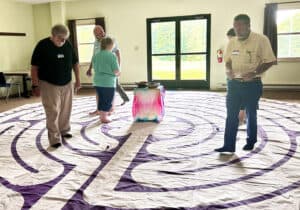
Clergy, local church lay leaders, and members of various Council for Health and Human Service Ministries (CHHSM) agencies came together Aug. 7, 2024, for a special UCC Heartland Conference/CHHSM retreat on harm reduction. The day featured discussion, workshop activities, worship, ritual, and reflection as attendees learned how to take action in ending the overdose crisis in the United States. The retreat was free to all, thanks to a generous grant from the Heartland Conference.
“Agents of Resurrection: Faithfully Ending Overdose,” the name of the retreat, aptly described the framework of not only the day, but of the action participants were trained to take back to their communities, churches, and places of work.
“Participants arrived with a deep longing for change,” said Minister Blyth Barnow, part of the UCC’s Harm Reduction working group and the Heartland Conference Harm Reduction Network. “They know this crisis personally and showed up with open hearts and minds, eager to serve as agents of resurrection in their community.”
The Rev. Dr. Dave Long-Higgins, conference minister of the Heartland Conference, agreed, and said much research and planning went into the retreat. “The Heartland Conference geography inhabits three of the top five states for opioid overdose deaths in the country,” he said. “This reality and the pain and grief it represents called us to find ways to respond that were actionable. The first step is to build awareness not only about the reality, but also to build a sense of capacity to be agents of healing though the channel of our congregations.”
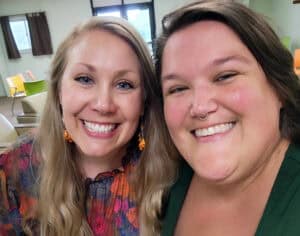
The day’s activities were created and/or written by the Rev. Dr. Elyse Berry, associate for advocacy and leadership development for CHHSM, including an opening ritual representing the face napkin used in Jesus’ burial (John 20:7).
The face cloth, the passage says, was folded up and placed separately. During those days, researchers have explained, if the master folded his napkin after eating, it indicated that he was coming back, that he was not yet finished.
During the retreat ritual, each participant took a linen napkin and wrote on it what was “not yet finished” for them — a name, message to a loved one who died from overdose, words that describe the current crisis, feelings, concerns, hopes for a movement of healing. Each person then placed their cloth on the altar and lit a candle.
“Sacred. Holy. Connected. There is something about the matter of harm reduction and substance use that can often open the door more quickly to vulnerability, sharing, and the feeling of the Spirit’s presence with us,” Berry said. “I felt so connected to the group from the beginning of the day, and that connection only deepened throughout the day.”
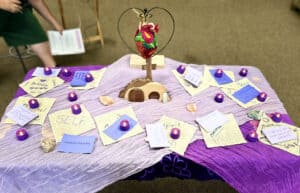
For the Rev. Fred Coulter, a member of St. John’s UCC in Defiance, Ohio, attending the retreat was deeply personal.
“One of my retirement goals is to focus on working with the recovery and mental health communities,” he said. “These two issues personally affect me because I am in recovery, and my family has a history of psychological problems, along with dysfunction.”
During the linen napkin exercise, Coulter said, “Writing ‘self’ on my cloth was a way to consider my new life in retirement.”
For many of the participants, it was difficult to choose just one moment that was most meaningful to them.
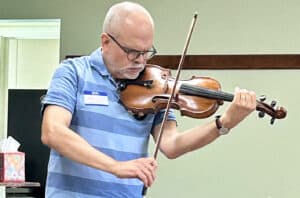
“The whole day was a long and wonderful ‘a-ha’ moment for me,” Coulter added. “From the leaders guiding me through the thought-provoking sessions to meeting others from around the state sharing their stories, to hearing David [Long-Higgins] playing his violin, to walking the labyrinth and picking up the stone at the end that said ‘change’ on it — to remind myself, I keep the stone in a place where I see it several times a day — to more fully understanding harm reduction. All these experiences have been coming back to me over the past weeks.”
Although much information, including statistics, were shared, the retreat was more than that. “We were able to ground this work as spiritual and incarnational work, understanding that love requires action, and that action has the power to save people’s lives,” said Long-Higgins. “I especially appreciated the articulation of a theology of resurrection that lies at the heart of harm reduction as a means to help people stay alive until they are ready to take the next steps toward their own healing.”
Participants also learned about naloxone, and took a naloxone kit back to their communities, plus information on how to acquire additional supplies if needed.
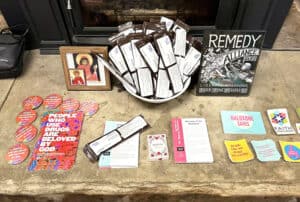
“Together, we learned how to recognize and respond to an opioid overdose, including how to administer the life-saving medication naloxone,” said Barnow. “As Christians, we are called to be agents of resurrection. It is not just a metaphor. We must be prepared to bring our communities back to life.”
Participants also received copies of the “Spirit of Harm Reduction: An Abridged Toolkit for Faith Communities” and the “Harm Reduction Toolkit for Worship.”
The UCC’s Harm Reduction Sunday took place Aug. 18, but Berry said that elements in the kit can be used throughout the year in various local church settings. “I am very thankful to Minister Blyth Barnow and the Rev. Dr. Elyse Berry for their wisdom, spirit, and outstanding leadership,” Long-Higgins added. “It is always a joy to partner with CHHSM on this annual retreat. It is always a wonderful day of learning and community building.”
Join Our Mailing LIst
"*" indicates required fields
